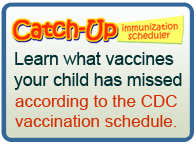Here you will find information on:
Checkups and Shots
Checkups
An important part of keeping your baby healthy is taking him to a pediatrician for “well baby” checkups. At each visit the doctor will weigh and measure your baby to make sure he is growing at a healthy rate, check his eyesight and hearing, and talk to you about his behavior. These visits also give you a chance to ask any questions you might have about your baby’s development.
A doctor should see your baby when your baby is:
- Within the first month
- Two months old
- Four months old
- Six months old
- Nine or fifteen months old
- 12 months old
Shots (Immunizations)
Your baby will need the following shots during the first 15 months of life:
- Hep B: Protects against hepatitis B, a serious liver disease
- DTaP: Protects against diphtheria, tetanus (lockjaw), and pertussis (whooping cough)
- Hib: Protects against haemophilus influenza type b
- Polio: Protects against polio. This vaccine is given as a shot (inactivated vaccine called IPV).
- MMR: Protects against measles, mumps, and rubella (German measles)
- Chickenpox: Varicella zoster vaccine protects against chickenpox
Use the chart as a guide for when your baby should get his shots. Shots can usually be given even if your baby has a cold or is sick on the day of the visit. Your doctor will determine a specific schedule for your child.
Your child may be eligible for his or her vaccines at a reduced rate. Please review The Centers for Disease Control Vaccines for Children Program page for additional information.
| Age | Shots needed |
| Birth to two months | Hep B |
| 1 to 4 months | Hep B |
| 2 months | DTaP, Hib, Polio |
| 4 months | DTaP, Hib, Polio |
| 6 months | DTaP, Hib, Hep B |
| 12 months | MMR, Hib, Polio, Chickenpox |
| 15 months | DTaP |
All babies should be immunized. Immunizations are required to attend child care and school. If you don’t have a pediatrician, call your local health department. They usually give shots to children (at no or low cost) or can help you find a clinic that provides shots.
Additional Resources
CDC Recommended immunization schedule for persons aged 0 through 18 years – United States, 2015 (with footnotes)
Medical Home
A Medical Home is the one place you can take your child for all your child’s health care needs.
- Checkups
- Sick visits
- Accidents
- Special health needs
- Immunizations (shots)
A Medical Home is a doctor’s office, a community clinic or a local health department. It is where the staff knows you, your child, and your child’s health history. You can call your Medical Home during office hours and after-hours.
Why Does Your Child Need a Medical Home?
A Medical Home offers the very best care for your child. Because the staff knows your child and your child’s health history, they can:
- Catch little problems before they become big ones
- Give you help and advice
- Make sure your child gets the checkups, screenings and shots he or she needs to stay well
- Help you find the right specialists and equipment for your child when needed
- Tell you about helpful community programs
When Your Child is Sick or Hurt
You have someone to call for help! The staff at your child’s Medical Home can tell you what you need to do.
- Treat your child at home (They will tell you how!)
- Come to the doctor’s office (They will make the appointment) or
- Go to the Emergency Room. The Emergency Room is for true emergencies - times when children may lose their life or risk their health without immediate treatment. It is rare when children need to go to the Emergency Room.
For Children with Special Health Care Needs
If your child has, or is at risk for, special health care needs, the Family Support Network (1-800-852-0042) can help you establish a Medical Home and get in touch with resources and services available in your area.
The American Academy of Pediatrics’ National Center of Medical Home Initiatives for Children with Special Needs website has information for parents and healthcare providers. It includes tools, training programs and materials, screening initiatives, grants and funding opportunities.
Additional Resources
- The Right Call Every Time – what is a medical home and how is it used? (Plain text version)
- Fever – the body’s way of fighting illness – quick guide on what to do when a child spikes a fever (Plain text version)
- Cold, the Flu and Other Infections – quick guide to treatment (Plain text version)
- Ear Infections - quick guide on what to do when your child has an inner or outer ear infection (Plain text version)
- Medical Home vs. Emergency Room – which should you choose and when (Plain text version)
- Make Each Doctor’s Visit Work for You – how to get the most out of every Medical Home visit. (Plain text version)
- Choosing a Quality Medical Home – suggests questions that can be asked when choosing (Plain text version)


